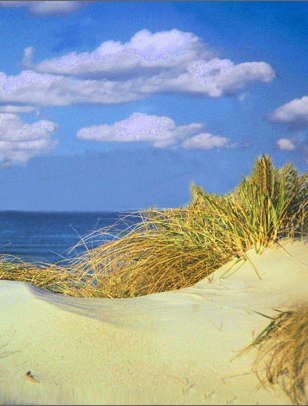 One recent dawn I walked along the beach of Green Turtle Cay on the Abaco Sea. In between watching the clouds as they heralded the slow unfolding of the day’s beginning, I observed the protective sand dunes that edged the shore. Most were lushly covered with natural vegetation and it was clear how the roots anchored the soil and stabilized the beach. Scattered cottages existed and one had chosen to put a barricade of timber near the crest of the dune.
One recent dawn I walked along the beach of Green Turtle Cay on the Abaco Sea. In between watching the clouds as they heralded the slow unfolding of the day’s beginning, I observed the protective sand dunes that edged the shore. Most were lushly covered with natural vegetation and it was clear how the roots anchored the soil and stabilized the beach. Scattered cottages existed and one had chosen to put a barricade of timber near the crest of the dune.
It brought to mind all that I had read about the notorious long-term ineffectiveness of seawalls and man’s mostly futile attempts to use walls to hold back the storm’s fury. Among other things, seawalls must eventually end, creating a weak spot that nature tends to attack, the juncture of hard surfaces with softer ones, providing an interaction that promotes erosion and undercutting. Hence the widespread move to protect sand dunes and the natural vegetation such as sea oats that serves as nature’s anchor.
I think of such things as “soft power” in contrast to the “hard power” of massive concrete structures and huge steel plates that form many seawalls. Soft power usually takes time, involves a process rather than an event, and generally requires working in harmony with what already exists. Another good analogy is a sail boat versus a power boat. Hard power is not automatically bad and soft power is not always the right solution. Both have their place. However, with our love of technology and speed, our short-term quarterly earnings focus, we tend to under rate the long-term benefits of soft power.
If all you have is a hammer, everything looks like a nail.
We tend to frame our solutions in terms of the resources most readily available. America is strong (still!) and we tend to resort to our military and economic power rather readily. True, our moral stature as the guys in white hats may have dimmed of late by some of our leaders’ Orwellian insistence that water boarding is not torture. True, the persuasiveness of capitalism and entrepreneurship as a solution to harnessing and directing human energy and creating prosperity may have been diminished by the unbridled greed of some and the virtual total abdication of oversight by Washington (how long would it take an NFL game to deteriorate into chaos if the referees walked off the field?). Nonetheless, America still has a stirring story of hope to share, a message of light to send. We still can be that “shining city on a hill” that inspires others to greatness.
It is inspiration, when it comes to us humans, that is a very strong form of soft power. The challenge for America as a country and for us as individuals, is to become and stay worthy of emulation, to become the change we seek, to live the virtues and strengths we espouse.
Where in your life would soft power be more effective?
Closing Quotes:
“If you want to build a ship, don’t drum up people together to collect wood and don’t assign them tasks and work, but rather teach them to long for the endless immensity of the sea.” — Antoine de Saint-Exupery, French pilot, writer, author of “The Little Prince” (1900-1944, shot down while on Allied WWII mission)
“You gather more flies with honey than with vinegar.” — Folk Wisdom
“Before automatically attempting to increase driving forces (i.e., hard power), analyze and attempt to remove restraining forces (soft power) as well.”
— Synopsis of Stephen R. Covey


0 Comments